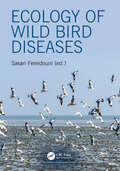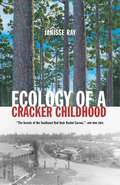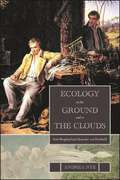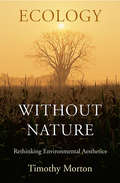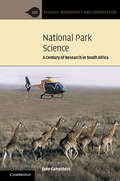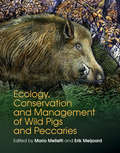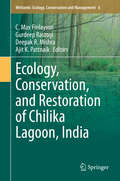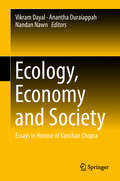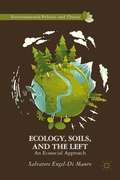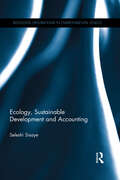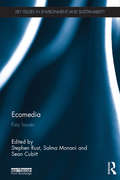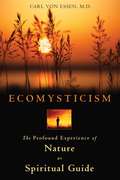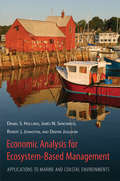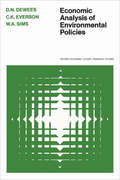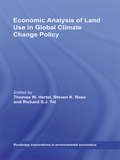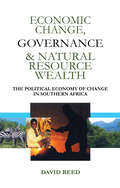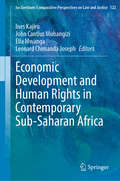- Table View
- List View
Ecology of Wild Bird Diseases
by Sasan FereidouniThe book focuses on the ecology of the most important infectious diseases of wild avian hosts, especially those with high morbidity and mortality rates. Disease ecology is an important scientific approach to study the relationships and interactions between living organisms, their environment, and potential pathogens. Birds have high diversity, and the very special ability to fly and migrate. They migrate over long distances, and share ecosystems with other animals, even humans. They serve as the most important natural source of several pathogens with zoonotic potential. Bird-pathogen interactions are increasingly changing due to the continuous anthropogenic disturbances in habitats and ecosystems. With intensified climate change and improved environmental conditions for vectors, as well as higher susceptibility of avian hosts due to simultaneous exposure to environmental stressors (e.g., contamination, food limitation, etc.), the probability of emerging new infections and their expansion into new territories increase tremendously. The Covid-19 pandemic has shown that neglected ecological and epidemiological interactions between wildlife, domestic animals and humans are paramount to global health.The book has a different approach to understanding complex and multiscale interactions among various ecological factors for the most important infectious diseases of wild birds. It provides valuable data to students and everyone who deals with avian species including biologists, researchers, conservationists, and policymakers.
Ecology of Wildlife Diseases in the Neotropics
by Gerardo Acosta-Jamett Andrea ChavesThis contributed volume focuses on the Neotropical region, and explores the environmental, ecological and socio-economic components that facilitate the emergence of zoonotic diseases. This book highlights the primary ecological, environmental, social, and economic variables associated with the risk of maintenance, transmission, and dissemination of emerging, re-emerging, and neglected infectious diseases, in which Neotropical vertebrates are involved. It compiles up-to-date knowledge and research for the neotropical region, as well as discusses the current needs of knowledge improvement. The chapters include various examples of the cycles of infectious diseases, all with world-wide relevance where neotropical wild vertebrates are affected or involved.
Ecology of Wisdom: Writings
by Arne NaessA founder of the Deep Ecology Movement, Arne Naess' has produced articles on environmentalism that have provided unmatched inspiration for ecologists, philosophers, and activists worldwide. This collection amasses a definitive group of Naess' most important works in which he calls for nonviolent, cooperative action to protect the Earth. Rich with observations, insights, and anecdotes, Naess' writings draw from Eastern religious practices, Gandhian nonviolent direct action, and Spinozan unity systems. Playful and compassionate in tone, Ecology of Wisdom showcases Naess' exceptional enthusiasm, wit, and spiritual fascination with nature, while educating each of us about the steps we must take to rescue the planet and illuminating the relevance of this important environmental advocate.
Ecology of a Cracker Childhood
by Janisse Ray"A tellingly honest tale of a girl who has grown up, against all odds, to become not only a lover of nature, but a spokeswoman for her place of origin and her 'Cracker' kin." -Thomas Rain Crowe, Rain Taxi "Every page of her book is equally vivid, whether she's describing the South Georgia junkyard where she grew up or the longleaf pine forests of today." -Sharon Rauch, Tallahassee Democrat "Janisse Ray knows that her region's story and her own story are insepa- rable; in many ways they are the same story. To tell that story as well as she tells it here is at once to show what has gone wrong and to light the way ahead. This book, clearly, is only a beginning. It is well done and is very moving." -Wendell Berry "A hauntingly beautiful work that explores the themes of loss and the redemption to be had through connection to family, culture and na- ture. Seamlessly weaving memories of her poverty-stricken childhood with musings about the destruction of die longleaf pine forests that once blanketed Georgia, Ray creates a tapestry of the landscape she carries 'inside like an ache.' She deftly spins the connections, offering what she has learned: That her personal story is inseparable from the story of her land." - Charleston Post and Courier
Ecology on the Ground and in the Clouds: Aimé Bonpland and Alexander von Humboldt (SUNY series in Environmental Philosophy and Ethics)
by Andrea NyeIn Ecology on the Ground and in the Clouds, Andrea Nye raises a question: In a time of climate change and environmental crisis, where should we look for inspiration? Is it to Alexander von Humboldt, the "inventor of nature" who viewed the cosmos from the lofty peak of Mount Chimborazo? Or is it to Humboldt's travel partner, the botanist Aimé Bonpland, who left Europe behind for forty years of conservation, agroforestry, and cooperative farming in the newly independent Republic of Argentina? For Bonpland, order and harmony are not unveiled with European reason and insight; they are made on the ground by intelligent, honorable, and diverse working men and women. Cosmos is not a hidden balance of nature; it is order in thought and action that ensures what we do is coherent and for the common good. It is fair and efficient government, just adjudication of disputes, and good management. It is loving attention to intricate "cogs and wheels" of natural processes at the same time as imagining new forms of beauty and stability in human communities and working landscapes.
Ecology without Nature: Rethinking Environmental Aesthetics
by Timothy MortonIn Ecology without Nature, Timothy Morton argues that the chief stumbling block to environmental thinking is the image of nature itself. Ecological writers propose a new worldview, but their very zeal to preserve the natural world leads them away from the "nature" they revere. The problem is a symptom of the ecological catastrophe in which we are living. Morton sets out a seeming paradox: to have a properly ecological view, we must relinquish the idea of nature once and for all. Ecology without Nature investigates our ecological assumptions in a way that is provocative and deeply engaging. Ranging widely in eighteenth-century through contemporary philosophy, culture, and history, he explores the value of art in imagining environmental projects for the future. Morton develops a fresh vocabulary for reading "environmentality" in artistic form as well as content, and traces the contexts of ecological constructs through the history of capitalism. From John Clare to John Cage, from Kierkegaard to Kristeva, from The Lord of the Rings to electronic life forms, Ecology without Nature widens our view of ecological criticism, and deepens our understanding of ecology itself. Instead of trying to use an idea of nature to heal what society has damaged, Morton sets out a radical new form of ecological criticism: "dark ecology."
Ecology, Biodiversity and Conservation: A Century of Research in South Africa (Ecology, Biodiversity and Conservation)
by Jane CarruthersSouth Africa is renowned for its wildlife and environmental conservation in iconic national parks such as the Kruger, one of the world's first formal protected areas. However, this is the first book to thoroughly analyse and explain the interesting and changing scientific research that has been accomplished in South Africa's national parks during the twentieth century. Providing a fascinating and thorough historical narrative based on an extensive range of sources, this text details the evolution of traditional natural history pursuits to modern conservation science in South Africa, covering all research areas of conservation biology and all the national parks around the country. It reveals the interaction between the international context, government, learning institutions and the public that has shaped the present conservation arena. A complex story that will interest and inform not only those involved in conservation science of South Africa, but worldwide.
Ecology, Biodiversity and Conservation: Marine Ecosystems
by Crowe, Tasman P. and Frid, Christopher L. J. Tasman P. Crowe Frid, Christopher L. J.Ecosystem services are emerging as a key driver of conservation policy and environmental management. Delivery of ecosystem services depends on the efficient functioning of ecosystems, which in turn depends on biodiversity and environmental conditions. Many marine ecosystems are extremely productive and highly valued, but they are increasingly threatened by human activities. With contributions from leading researchers, this volume synthesises current understanding of the effects on biodiversity and ecosystem functioning caused by a variety of human activities and pressures at play in coastal marine ecosystems. The authors examine the likely consequences for ecosystem service provision, covering key topics including fisheries, aquaculture, physical structures, nutrients, chemical contaminants, marine debris and invasive species. Critically reviewing the latest developments, this is a unique resource both for environmental managers and policy-makers, and for researchers and students in marine ecology and environmental management.
Ecology, Biodiversity, and Conservation: Detecting and Responding to Alien Plant Incursions
by Wilson John R. Panetta F. Dane Cory LindgrenEcologists, land managers and policymakers continue to search for the most effective ways to manage biological invasions. An emerging lesson is that proactive management can limit negative impacts, reduce risks and save money. This book explores how to detect and respond to alien plant incursions, summarising the most current literature, providing practical recommendations and reviewing the conditions and processes necessary to achieve prevention, eradication and containment. Chapter topics include assessing invasiveness and the impact of alien plants, how to improve surveillance efforts, how to make timely management decisions, and how legislation and strategic planning can support management. Each chapter includes text boxes written by international experts that discuss topical issues such as spatial predictive modelling, costing invasions, biosecurity, biofuels, and dealing with conflict species.
Ecology, Conservation and Management of Wild Pigs and Peccaries
by Mario Melletti Erik MeijaardWild pigs inhabit vast areas in Europe, Southern Asia and Africa, and have been introduced in North and South America, while feral pigs are widespread in Australia and New Zealand. Many wild pig species are threatened with extinction, but Eurasian wild boar populations, however, are increasing in many regions. Covering all wild pig and peccary species, the Suidae and Tayassuidae families, this comprehensive review presents new information about the evolution, taxonomy and domestication of wild pigs and peccaries alongside novel case studies on conservation activities and management. One hundred leading experts from twenty five countries synthesise understanding of this group of species; discussing current research, and gaps in the knowledge of researchers, conservation biologists, zoologists, wildlife managers and students. This beautifully illustrated reference includes the long history of interactions between wild pigs and humans, the benefits some species have brought us and their role and impact on natural ecosystems.
Ecology, Conservation, and Restoration of Chilika Lagoon, India (Wetlands: Ecology, Conservation and Management #6)
by C. Max Finlayson Gurdeep Rastogi Deepak R. Mishra Ajit K. PattnaikThis book chronicles the decades-long work of studying, analyzing, and reversing the environmental pressures that threatened India’s Chilika Lagoon, the largest brackish-water lagoon in the region, and the second largest in the world. Designated as one of India’s first Ramsar Sites in 1981, Chilika Lagoon continued to degrade for a decade longer. Then, the Chilika Development Authority (CDA) was established to gather information and devise a restoration plan that benefits the ecosystems of the lagoon, with sensitivity to the needs and livelihoods of local communities. Expert contributors detail the work of analysis, planning and implementation, including extensive coverage of such topics as: Devising a plan for implementing Ramsar wise use guidelines Sedimentologic, chemical, and isotopic impacts Hydrodynamics and salinity Runoff and sediment in watersheds of the Lagoon's Western Catchment Long-term analysis of water quality and continued water quality monitoring Bio-optical models for cyclone impact assessment Studies of geomorphology, land use, and sedimentary environments Spatiotemporal assessment of phytoplankton communities Creation of a post-restoration scenario for fish and fisheries Assessing status of waterbirds, species diversity and migration patterns The result was a major hydrological intervention to re-establish hydrological and salinity regimes, biodiversity, and fish catches, and help protect the livelihood of lagoon-dependent communities. The story of the rehabilitation and management of Chilika Lagoon demonstrates that it is possible to halt and reverse the encroachment and degradation of wetlands, to restore biodiversity and to provide benefits for large numbers of people. Ecology, Conservation, and Restoration of Chilika Lagoon goes beyond scientific research articles to explore institutional and governance issues, political ecology, and the Ramsar Convention’s guidelines for ecosystem restoration. The book will benefit researchers, wetland managers, government policy makers and more general readers concerned with restoration and conservation of wetlands around the planet.
Ecology, Economy and Society: Essays in Honour of Kanchan Chopra
by Vikram Dayal Anantha Duraiappah Nandan NawnThis book deals with not just complex linkages, interactions and exchanges that form the relationship between the economic activities, human society and the ecosystems, but also the influences and impacts that each causes on the other. In recent times, this ecology–economy–society interface has received unprecedented attention within the broader environment–development discourse. The volume is in honour of Kanchan Chopra, one of the pioneers of research in these areas in India. She has recently been awarded the coveted Kenneth Boulding Award by the International Society for Ecological Economics (ISEE) and is the first Asian to receive it. The four sub-themes of the book reflect some of the important areas in the environment–development discourse — sustainability of development, institutions and environmental governance, environment and well-being, and ecosystem and conservation. Within each of the sub-themes, the policy and the practice as well as the macro and micro aspects are addressed. With contributions mainly from ecological economists and ecologists, the book’s approach is interdisciplinary, both in spirit and content, reflecting the honoree's work, which went not just beyond the mainstream ideology of economics, but also the way she listened to ideas from disciplines like ecology and sociology. The volume also includes two reflective essays on academic life and works of Kanchan Chopra. The book is a valuable resource for students, teachers, researchers, practitioners and policy makers in the areas of development economics, ecological economics, environmental economics and related disciplines such as conservation, development, ecology, economics, environment, governance, health, sociology and public policy.
Ecology, Ethics, and Interdependence: The Dalai Lama in Conversation with Leading Thinkers on Climate Change
by Daniel Goleman Dunne D. JohnPowerful conversations between His Holiness the Dalai Lama and leading scientists on the most pressing issue of our time. Engage with leading scientists, academics, ethicists, and activists, as well as His Holiness the Dalai Lama and His Holiness the Karmapa, who gathered in Dharamsala, India, for the twenty-third Mind and Life conference to discuss arguably the most urgent questions facing humanity today: What is happening to our planet? What can we do about it? How do we balance the concerns of people against the rights of animals and against the needs of an ecosystem? What is the most skillful way to enact change? And how do we fight on, even when our efforts seem to bear no fruit? Inspiring, edifying, and transformative, this should be required reading for any citizen of the world.
Ecology, Soils, and the Left
by Salvatore Engel-Di MauroSoil degradation is real and global, even if the evidence is not so easy to glean. Degradation poses comparable risks to greenhouse gas emissions, deforestation, and nonhuman animal extinctions. Few have noticed soil degradation as the problem it has become, except most indigenous peoples in their struggles for survival.
Ecology, Sustainable Development and Accounting (Routledge Explorations in Environmental Studies)
by Seleshi SisayeAccounting literature has viewed sustainability in terms of social, economic and environmental performances. There have been concerns that the relationship between sustainability, accounting and organizational performance cannot be explained unless we can deduce patterns of administrative behaviour that chronicle management practices. Ecology, Sustainable Development and Accounting argues that, despite the broader social and economic development dimensions of sustainability and the limitations of its extension to corporate and organizational behaviour; an ecological framework is capable of providing the overall societal and community chronologies that describe corporate sustainable operations. Drawing examples from international development and federal government organizations, this book documents the link between ecology, corporate sustainable development, and sustainability accounting and reporting. It draws together the literature from several disciplines to elaborate the contribution of the ecological approach to sustainable development in the accounting literature. This book will be of particular interest to students, academics and practitioners in the areas of environmental studies, ecological economics, sustainable development studies, and social and environmental accounting. The sociological and anthropological perspectives make this book the first of its kind to apply the population ecology of sociology to both the sustainability and accounting literature.
Ecology: Evolution, Application, Integration
by David T. KrohneEcology: Evolution, Application, Integration provides students and instructors with a groundbreaking evolutionary approach that transforms ecology from a collection of disassociated facts into an integrated, concept driven discipline. Since most ecological interactions are rooted in adaptive evolution, students learn to place ecological problems in an evolutionary context, thinking critically instead of just memorizing facts. This text develops scientific reasoning skills by teaching students not just what we know about the field, but also how we know what we know about it. <p><p> Each chapter of Ecology begins with a fundamental ecological question. The sections of the chapter are designed around a logical sequence of smaller questions, the answers to which eventually enable students to answer the chapter's main question. This approach models the process of science; as students gain experience with this approach, they can apply it to new problems and questions. <p><p> Ecology: Evolution, Application, Integration is distinguished by the following approaches: Integrates modern evolutionary theory throughout <p>Highlights applications and connections to the real world <p>Emphasizes inquiry, critical thinking, and the process of science <p>Presents quantitative topics clearly and in real world applied contexts
Ecología y política
by Sara LarraínUna breve y útil exposición de la historia y las principales corrientes ecologistas, desde Platón a nuestros días El cambio climático ha sido generado por nuestra forma de habitar la Tierra: por nuestros patrones de producción y consumo basados en combustibles fósiles —carbón, petróleo y gas—, por la doctrina económica dominante y globalizada —sobre todo por sus modelos de negocios—, y por el extractivismo desatado sobre todos los recursos naturales y ecosistemas del planeta. La emergencia climática, cuya más drástica amenaza es el calentamiento global y el fin de las aguas y los bosques como hoy los conocemos, ya está afectando gravemente a todos los pueblos y comunidades que dependen en forma directa de la naturaleza y se aproxima a devastar las formas de vida urbanas. Ante este escenario, la destacada ambientalista chilena Sara Larraín, discípula de Gastón Soublette, quien durante décadas se ha dedicado a enseñar los fundamentos filosóficos del pensamiento ecologista, ofrece un conciso y fundamental ensayo de divulgación filosófica. La actualidad del problema, ante el catastrófico escenario global, supone una oportunidad única para aquellos que, alarmados ante el cambio climático, desean introducirse con urgencia en las raíces del pensamiento medioambiental.
Ecomedia: Key Issues (Key Issues in Environment and Sustainability)
by Sean Cubitt Stephen Rust Salma MonaniEcomedia: Key Issues is a comprehensive textbook introducing the burgeoning field of ecomedia studies to provide an overview of the interface between environmental issues and the media globally. Linking the world of media production, distribution, and consumption to environmental understandings, the book addresses ecological meanings encoded in media texts, the environmental impacts of media production, and the relationships between media and cultural perceptions of the environment.Each chapter introduces a distinct type of media, addressing it in a theoretical overview before engaging with specific case studies. In this way, the book provides an accessible introduction to each form of media as well as a sophisticated analysis of relevant cases. The book includes contributions from a combination of new voices and well-established media scholars from across the globe who examine the basic concepts and key issues of ecomedia studies. The concepts of "frames," "flow", and "convergence" structure a dynamic collection divided into three parts. The first part addresses traditional visual texts, such as comics, photography, and film. The second part of the book addresses traditional broadcast media, such as radio, and television, and the third part looks at new media, such as advertising, video games, the internet, and digital renderings of scientific data. In its breadth and scope, Ecomedia: Key Issues presents a unique survey of rich scholarship at the confluence of Media Studies and Environmental Studies. The book is written in an engaging and accessible style, with each chapter including case studies, discussion questions and suggestions for further reading.
Ecomysticism: The Profound Experience of Nature as Spiritual Guide
by Carl Von EssenExplores the philosophy, science, and spirituality of nature mysticism and its Green calling • Offers a solid bridge between spiritual practice and environmental activism • Reveals how we can heal the environment by renewing our connection to it • Shows how spiritual encounters in nature are healing the Nature Deficit Disorder of our psyches and bodies Many have been struck by a majestic moment in nature--a sole illuminated flower in a shady grove, an owl swooping silently across a wooded path, or an infinitely starry sky--and found themselves in a state of expanded awareness so profound they can feel the interconnectedness of all life. These trance-like moments of clarity, unity, and wonder often incite a call to protect and preserve the earth--to support Nature as she supports us. Termed “nature mysticism,” people from all cultures have described such experiences. However, the ever-increasing urbanization of the world’s population is threatening this ancient connection as well as the earth itself. In Ecomysticism, Carl von Essen explores nature mysticism through the recorded experiences of outdoor enthusiasts as well as scientific studies in biology, psychology, and neuroscience. Citing consciousness scholar William James and a variety of well-known nature lovers such as Ansel Adams, Henry David Thoreau, and Ralph Waldo Emerson, von Essen shows how the spiritual transcendence from an encounter in nature--like other mystical experiences--is healing the Nature Deficit Disorder of our psyches and bodies, leading to an expansion of our worldview and a clearer understanding of our self and of our natural world. Offering a solid bridge between spiritual practice and environmental activism, von Essen’s spiritual ecology reveals how only through a renewal of humanity’s spiritual connection to nature can we effect true environmental healing.
Economic Analysis for Ecosystem-Based Management: Applications to Marine and Coastal Environments
by Robert Johnston Daniel Holland James Sanchirico Deepak JoglekaOcean and coastal management regimes are increasingly subject to competing demands from stakeholders. Regulations must not only address fishing, recreation, and shipping, but also sand and gravel mining, gas pipelines, harbor/port development, offshore wind and tidal energy facilities, liquefied natural gas terminals, offshore aquaculture, and desalinization plants. The growing variety and intensity of ocean and coastal uses increases the call for a more holistic, comprehensive, and coordinated management approach that recognizes the often complex relationships between natural and human systems. For both economist and non-economist audiences, this book describes ways in which economic analysis can be an important tool to inform and improve ecosystem-based management (EBM). Topics include modeling economic impacts, benefit-cost analysis, spatial considerations in EBM, incentives and human behaviors, and accounting for uncertainty in policy analysis. Throughout the book the authors elucidate the different kinds of insights which can be gained from the use of different economic tools. In this rigorous and accessible work, the authors defy the conventional stereotype that economic perspectives necessarily favor the greatest commercial development. Instead, they demonstrate how comprehensive economic analyses consider the full range of potential services offered by marine and coastal ecosystems, including the conservation of biodiversity and creation of recreational opportunities.
Economic Analysis of Environmental Policies
by C. K. Everson Donald Dewees William SimsA framework is concisely presented for the economic analysis of pollution problems and for evaluating proposed solutions. The substantial recent literature on environmental economics is reviewed and related to Ontario environmental policy. Topics include the theory of externalities as an explanation of environmental problems, policy objectives, costs of information and monitoring, and the impact of these costs on control policy selection. Three case studies of specific pollution problems – sulphur dioxide from a smelter, lead from downtown factories, and urban automobile emissions – are given, and possible solutions explored. The authors' methodology is applicable not only to air and water pollution but also to noise, aesthetic degradation, and solid waste. This study will be welcomed by specialists, civil servants, and students trying to understand the economic aspects of environmental maintenance.
Economic Analysis of Environmental Policy
by Ross MckitrickThe relationship between economic growth and the environment is at the forefront of public attention and poses serious challenges for policymakers around the world. Economic Analysis of Environmental Policy, a textbook for advanced undergraduate and graduate courses, provides a rigorous and thorough explanation of modern environmental economics, applying this exposition to contemporary issues and policy analysis.Opening with a discussion of contemporary pollution problems, institutional players and the main policy instruments at our disposal, Ross McKitrick develops core theories of environmental valuation and optimal control of pollution. Chapters that follow cover issues like tradable permits, regulatory standards, emission taxes, and polluter liability as well as advanced topics like trade and the environment, sustainability, risk, inequality, and self-monitoring. Throughout, McKitrick uses clear, intuitive, and coherent analytical tools, so that students, academics, and practitioners can develop their policy analysis skills while comprehending the debates and challenges at the frontier of this exciting and rapidly-developing field.
Economic Analysis of Land Use in Global Climate Change Policy (Routledge Explorations in Environmental Economics)
by Thomas W. Hertel Steven K. Rose Richard S. J. TolLand has long been overlooked in economics. That is now changing. A substantial part of the solution to the climate crisis may lie in growing crops for fuel and using trees for storing carbon. This book investigates the potential of these options to reduce greenhouse gas emissions, estimates the costs to the economy, and analyses the trade-offs with growing food. The first part presents new databases that are necessary to underpin policy-relevant research in the field of climate change while describing and critically assessing the underlying data, the methodologies used, and the first applications. Together, the new data and the extended models allow for a thorough and comprehensive analysis of a land use and climate policy. This book outlines key empirical and analytical issues associated with modelling land use and land use change in the context of global climate change policy. It places special emphasis on the economy-wide competition for land and other resources, especially; The implications of changes in land use for the cost of climate change mitigation, Land use change as a result of mitigation, and Feedback from changes in the global climate to land use. By offering synthesis and evaluation of a variety of different approaches to this challenging field of research, this book will serve as a key reference for future work in the economic analysis of land use and climate change policy.
Economic Change Governance and Natural Resource Wealth: The Political Economy of Change in Southern Africa
by David ReedThis volume analyzes the ways in which natural resource wealth has shaped authoritarian political regimes and statist economic systems in the countries of southern Africa in the post-colonial period. It consists of five essays. The first sets out the historical framework and emergence of natural resources as the crucial driver of economies in sub-Saharan Africa. Three essays, drawing on in-country research, focus on Tanzania, Zambia and Zimbabwe. They show how this explains the economic evolution of those countries - in particular, the impacts of economic and institutional changes on the bulk of the population, the rural poor. The final essay explores the nature of the changes and their neoliberal economic context, and the ways in which their harmful consequences might be relieved.
Economic Development and Human Rights in Contemporary Sub-Saharan Africa (Ius Gentium: Comparative Perspectives on Law and Justice #122)
by Ines Kajiru John Cantius Mubangizi Elia Mwanga Leonard Chimanda JosephThis book explores the connections between economic development and the protection of human rights. Drawing on experiences from Sub-Saharan African countries, the book demonstrates how various economic activities impact the protection of human rights in Sub-Saharan Africa. The book explores the core concepts and principles, theory and practice, accountability mechanisms, and key challenges to the protection of human rights in Sub-Saharan Africa in the era of global economic development. It also shows the ways in which human rights law and development can be used to obtain relief for the victims of environmental degradation or adverse effects of climate change in Africa. In addition, it places emphasis on development and economic policies to highlight the pros and cons of using human rights-based approaches and its significance in the context of economic development and human rights in Africa. The book is divided into three parts: Part I focuses on the conceptual and theoretical foundations of human rights and economic developments in Africa and covers essential concepts, historical perspectives, the African human rights framework, human rights litigation, and comparative approaches. Part II addresses the intersection of economic development and human rights in Sub-Saharan Africa, including human rights and individual liberties in the context of economic empowerment of citizens; human rights and the development of regional economic integration; human rights and economic independence; human rights and the economic empowerment of vulnerable groups; and human rights and cultures. The third and final part focuses on challenges and prospects of human rights and the economy in Sub-Saharan Africa by taking a closer look at human rights and globalization, cultural relativism, science and technology, state sovereignty, and governance structures and systems. The book is intended for researchers, policymakers, university students, and practitioners in international human rights law, environmental law, natural resources law and development.
